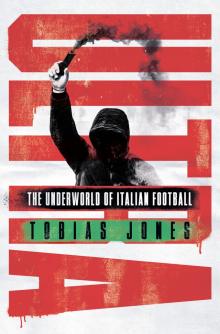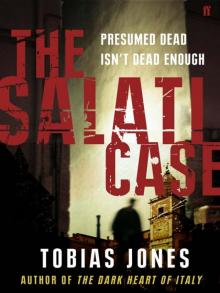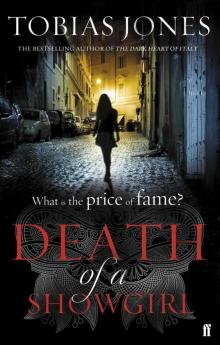- Home
- Tobias Jones
The Salati Case Page 7
The Salati Case Read online
Page 7
‘No. I’ve had it in the company safe for a year or so. Silvia gave it to me when her last illness was getting serious. She brought it into this office and said it was to be opened as soon as she died.’
‘And when did you open it?’
‘On Saturday morning. I was informed of her death and followed instructions. I took her letter out of the safe and read it.’
‘And did she name me personally or ask you to hire the first name out of the phone book?’
‘She wanted you.’
‘And who did you tell about this?’
Crespi frowned. He realised he was under polite interrogation and he didn’t like it.
‘Who?’ I asked again, so there could be no mistake.
‘I must have … I mentioned it to my secretary. I keep her informed of all the cases I’m dealing with.’
‘She’s the statue in the front office?’
‘Giovanna Monti,’ he said gravely, as if my description was a slur on her honour.
‘You told her on Saturday the case was going to be reopened.’
He shrugged and nodded in one movement. ‘She would never divulge anything that goes on in this office.’
‘So who else did you mention it to?’
The man paused long enough to show that he was running a memory check. He wasn’t as discreet as he made out.
‘No one. Absolutely no one,’ he said with certainty.
‘All right, call her in.’
He looked at me with disdain and pressed an intercom on his desk. ‘Signora Monti, would you mind coming in here one minute?’
He looked at me again now with defiance. The woman came in. I stood up out of politeness, but she still towered over me. She nodded in my direction, and I took it as a chance to sit down again.
‘Please,’ Crespi pointed at another armchair on the other side of his office. She sat on the arm, her spine as straight as a sword.
‘As you know, Signora,’ Crespi intoned, ‘Castagnetti here is helping us to honour the last wishes of the late Salati, Silvia, in order to establish the legal status of her son, Salati, Riccardo.’
She nodded briefly.
‘He believes knowledge of his ensuing investigation preceded his commission. He is curious to know whether you, or I’, he said hastily, ‘might have informed anyone else of the investigation during the course of last weekend.’
She looked at me, but turned back to Crespi and answered to him.
‘I …’ She didn’t say anything more than that.
‘Who?’ I said.
‘I might have mentioned it to a friend.’
‘Who?’
‘Serena.’
‘Who’s that?’
‘Works in a law firm off Via Farini.’
‘The Tonin firm?’
She nodded.
‘Who is this Serena? One of the lawyers?’
‘Receptionist.’ The woman looked across at Crespi as if to apologise. I nodded at them both as if I had won a small victory. That was one of the satisfactions of this job: showing conceited people that they weren’t as perfect as they thought they were.
I was walking towards the Tonin office when the phone started ringing.
‘Sì.’
‘Your friend Lo Bue’s a nice piece of work,’ Dall’Aglio said.
‘Meaning?’
‘He opened up his wife with a carving knife when she said she was leaving him. He did four months for battery.’
‘Four months?’ I sighed. The court case usually lasts longer than the sentence in Italy.
‘He’s done time before that for the usual: fencing stolen goods, importing Albania’s finest tobacco, that sort of thing. He’s certainly been through the university of life.’
‘Only problem with that university is the graduation.’
Dall’Aglio laughed.
‘Who’s he with?’ I said, serious again.
‘How do you mean?’
‘Has he got a big family?’
Dall’Aglio caught the inference. ‘He’s from Calabria, but that doesn’t mean anything.’
‘Means enough,’ I said, and hung up. I’m not one of those people who pretend they’re not prejudiced. I think everyone is
prejudiced, I reckon it’s impossible not to be. All our wisdom is received rather than invented. I’m willing to be proved wrong, but when a tough nut and his crew are from Calabria, I assume he’s only a phone call away from the ’Ndrangheta.
When I got to the law offices, there was a girl on the front desk. She was so beautiful that I looked for longer than I needed to. She had round cheeks, big eyes and thick hair in loose curls. She wasn’t wearing any jewellery or make-up, and it didn’t look like she needed to.
‘Can I help?’ she asked as I walked up to the desk.
‘Already have.’
‘I’m sorry?’
‘Never mind. Tonin not in?’
‘No.’
‘You Serena?’
She nodded.
‘How long have you worked here?’
‘Who are you?’
‘Castagnetti. I’m an investigator. I had a little chat with old Tonin this afternoon. He said it would be OK if I asked you a couple of things.’
She looked around at the shut doors of the adjoining offices.
‘The name Riccardo Salati mean anything to you?’
She looked at me and shook her head.
‘How about Giovanna Monti, know her?’
‘Sure, she’s a friend.’
‘You talk to her on Saturday?’
‘I expect so, I don’t remember.’ She was smiling like she was more amused than worried.
‘She tell you they were reopening a case from way back?’
She closed her eyes. ‘Yes, I remember. She might have said something.’
‘And did you tell anyone else in this office?’
‘I don’t talk to anyone in this office about anything other than work.’
‘You don’t like them?’
‘It’s not that. It’s just that our relationship is professional.’
I wondered just how professional she was. She looked it all right, her blouse all buttoned up like an ice-cool receptionist. But she might have let something slip, or someone might have overheard her conversation. Either way, the arrows were pointing towards Tonin.
‘What’s old Tonin like?’ I asked.
She looked at me like I was asking her to be unprofessional. ‘He’s an old-fashioned gentleman.’
‘Meaning?’
‘He’s courteous and kind.’
‘That a professional judgement?’
‘It was my mother’s judgement if you really want to know. She worked here for thirty years before I started. She died suddenly last year, and Massimo looked after me, offered me this job whilst I was getting myself back on my feet.’
‘What about Tonin’s family?’
She looked at me with suspicion, as if I was asking too many questions.
‘Is he married?’
‘Sure.’
‘Kids?’
She nodded. ‘Just one. Sandro. He’s,’ she paused, ‘he’s had his problems with stuff.’
‘What sort of problems?’
‘Substance abuse. He’s crossed the line from can’t get enough to had too much.’
‘It’s a short step,’ I said. ‘Where does he work?’
‘Here often. Not that I would call it work. He’s not even a qualified lawyer. He comes in to call his friends and download films and music as far as I can work out. Uses me as a secretary.’
‘I can see the attraction.’
She blushed slightly, but held my stare like she wanted to play the game.
‘How old is he?’
‘About your age. Mid-thirties.’
‘Which office does he sit in when he comes in?’ I asked.
She thumbed over her shoulder behind her. I wandered over into what looked more like a box room. There was a modern computer set up the
re though. I began shutting the door as I was asking her questions.
‘This Sandro got a woman?’
‘His shirts are ironed,’ she said, turning round towards me.
‘What’s that supposed to mean?’
‘What I said. His folds are straight. I guess it’s his mother. I’ve heard she goes into his flat every day just to make the bed. She fills up his fridge with stuff she’s cooked.’
‘You don’t like this Sandro?’
I watched her through the half-shut door. She shrugged like she was too honest to deny it, but too kind to say it.
I shut the door of Sandro’s office and kept asking her questions. ‘And who was in the office on Saturday?’
‘Sandro was in,’ I heard her faintly now, but clearly enough. ‘He normally comes in on a Saturday.’
‘Just Sandro and you?’
‘I think so. There would have been a few clients coming through, dropping off documents or picking them up.’
‘And when this Giovanna Monti friend was telling you about this case they were reopening, who was in the room?’
‘I can’t remember. But I didn’t even know what Giovanna was talking about, I was just listening to her chat. That’s what we do on Saturday mornings because it’s always quiet. We call each other and make plans for the evening. I can’t even remember this Riccardo you were talking about.’
I came out of Sandro’s pseudo-office having heard every word. The box room wasn’t exactly soundproof. Whether it was Sandro or not, someone in the Tonin office had heard that Silvia Salati had died and that she had hired a private detective. Someone had decided to reach for some sand, as they say. Decided to throw some sand in our eyes. Sand up the joints and cogs and connections. Insabbiatura, they called it.
I walked out. I didn’t understand anything any more. Meeting that Serena girl in Tonin’s office had thrown me. I had a small breakthrough, but all I could think about were those cheeks and those dark, innocent eyes. She seemed pure, and you don’t come across a lot of purity in my line. The fact that she had lost her mother made me think we might even have something in common.
I tried to get my mind back on the job. That mourning notice. There was no way it was genuine, but it intrigued me. It might just have been someone playing a prank, but it was more likely that someone was trying to pretend Riccardo was alive and well, and the only people who usually do that know the opposite is true. It was a lead and it had led me, a second time, to Tonin.
Wednesday
The sound of my phone invaded a dream. It was ringing and rattling the wood of the table beside my bed. I looked at the number but didn’t recognise it.
As soon as I answered, a slurred, female voice was screeching: ‘Why did you have to tell her?’
‘What?’ The lime-green numbers on my alarm clock said 5:53. ‘Who is this?’
‘I don’t know why you had to tell her.’
I walked into the kitchen and listened to her voice. It must have been the woman from Rimini. ‘Tell her what? That her grandmother had died?’
‘It’s none of your business.’
‘Business is all it is to me.’
‘You make money out of grief, that it?’
‘Didn’t look like you were doing much grieving. And she phoned me. She found my number somewhere and started asking questions. All I did was answer them. Maybe you should try doing the same.’
‘And telling her that her grandmother was dead wasn’t enough. You went and told her that her father might be alive.’
I rubbed my forehead. ‘No, no I didn’t. I said I had no evidence he was dead.’
‘Same thing. You come here out of nowhere and start whispering, bringing back …’
‘What?’
‘Everything.’
‘I’ve brought back nothing so far.’ I wanted to go back to bed but the woman sounded drunk and exhausted and I wanted to hear what she would spill. I untwisted the angular hour-glass of the coffee machine and filled the bottom half with water. I spooned the brown powder into its tray and twisted the two halves back together.
‘You’ve brought back pain and misery is what you’ve done. She’s been up most of the night, screaming at me for being an unnatural mother.’
‘There’s no such thing.’ I listened to the woman stammering. ‘Let me guess, she’s finally asleep and you’re in the kitchen swimming in self-pity and any kind of grappa you can lay your hands on, right?’
‘ ’Fanculo.’ She said it like she couldn’t even summon up the necessary anger.
‘Listen, I’m sorry if I’ve caused you trouble. Like I said, I answered the phone and answered her questions, that’s all.’
She sighed.
‘You don’t get on with your daughter, do you?’
‘No mother gets on with a fifteen-year-old daughter. Especially when people like you come along and start stirring things up.’ There was silence down the line and I said nothing. ‘I love her,’ she started saying, ‘and I get nothing in return. I look after her every minute of my waking life and she acts like I’ve wronged her somehow. Said her father would never have left if I had treated him properly. She wants to prove her independence from me by throwing every insult she knows, but the moment there’s a whisper her father might not be dead, she’s desperate to be a little child again, to be caught up in his arms and thrown in the air.’
I heard the machine roaring the arrival of the coffee. I held the black plastic bud and lifted up the metallic lid. The last of the coffee was spitting up into the upper chamber. I switched off the gas, poured the coffee into a small cup and took it over to the window.
‘You see,’ she was going on, ‘I can give up on Ricky. Truth told, I gave up on him years ago. I gave up on him even before he went missing. I knew he would never be around long enough to be a father and a husband. But she can’t let it go. How can a little girl give up on her father?’
‘There are going to be more surprises for her before this is over.’
‘What’s that supposed to mean?’
‘It means there’s not a lot your little girl can take for granted.’
‘What do you mean?’
‘I need to check a couple of things, but I think she might have something to gain as well as to lose. Listen, I’m in Rimini today, I’ll come round.’
‘I don’t want you going near her.’
‘That hurts.’ I laughed. ‘I’ll see you later.’ I snapped the phone shut.
I pulled up the shutters. Outside the darkness was just beginning to give way to daylight. Through the fog I could just see the street lamps clicking off one by one. There were no cars on the roads and the only noise was the incessant chirping and trilling of birds.
The steam from my coffee created tiny bubbles on the window. I began drawing a stick man. Drips colluded and ran down the pane.
I went to find some clothes. I only get dressed for two reasons: modesty and warmth. I shave my head more often than I shave my chin. I never wear a suit or a tie. I am, by the standards of this chic city, a lost cause, a visual embarrassment to myself. Here if you don’t dress up every day you’re a nobody. If there’s not a certain sheen to your appearance which points you out as a person of importance, people forget you’re there. They assume that either you’ve got no eye or, even worse, no wallet. So they don’t notice you, or, if they do, they underestimate you, which is exactly the way I want it.
I dressed quietly and went out into the cold. I walked aimlessly. I passed a newsagent just opening up. The man was putting out the board with the day’s headlines. TALKS STALLED, it said under the logo of a national newspaper. The latest round of national pay negotiations had hit the buffers and the newspaper would be full of comment about how the country was descending into crisis.
The real news was that nothing was happening. Which was what normally happened in winter. Here, everything is as regular as clockwork: the schoolchildren, the buses, the meetings, the meals. It feels like the most punctual city in Italy.
There’s something about the way people walk: they all know where they have to be next. If dinner isn’t served at the expected hour grown men think the end of the world is nigh.
I saw a couple jogging towards the Parco Ducale. Every now and then I heard the judder of a shop’s metallic shutters being raised.
It was almost eight and I headed towards Tonin’s office on one of the side streets off Via Farini. I was half hoping that the girl from last night would be there, but when I rang, the same male voice from yesterday spoke.
‘We’re on the ground floor on the left.’
The door clicked open. I wandered across the cold stone. There, on the left, stood an old man. He looked distinguished. He had a tie and a walking stick and smelt of expensive aftershave.
‘Good morning,’ he said formally. ‘You must be Castagnetti.’
I nodded. ‘You’re Tonin?’
The man held the door open for me. The office was similar to Crespi’s: furnished to feel luxurious. Entire walls were covered with legal reference books. He motioned for me to sit down.
‘You found us all right?’ he asked.
‘I’m here aren’t I?’
‘Could I offer you a coffee?’ There was steel inside his politeness, as if his politeness was nothing more than a warning that he expected deference in return. By being so overtly accommodating, he made it clear that he demanded esteem and subtlety. It was a charade that many powerful men played, a sort of conversation in code.
‘I assume this is about the will?’ he said, as if he were asking after my mother.
It was a strange question to ask. But that’s what lawyers did. They went to the documents and the money.
‘You’re wanting to prove Ricky’s dead?’ Tonin asked again.
I nodded. I would let the man ask his questions, but I didn’t like it.
‘Silvia’s other son,’ the man went on, placing a spoon back on the saucer, ‘what’s he called? Umberto is it? He’ll be wanting to prove Riccardo is dead. It makes sense.’
I looked at him. It wouldn’t be difficult to make the man come clean, but he would need a bit of flushing.
‘Listen,’ I interrupted, ‘I think you’re in trouble either way. You withheld information.’

 Ultra
Ultra The Salati Case
The Salati Case Death of a Showgirl
Death of a Showgirl The Dark Heart of Italy
The Dark Heart of Italy